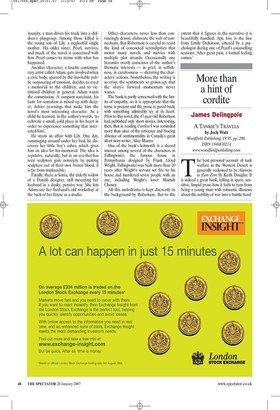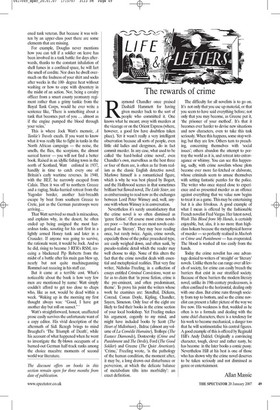More than a hint of cordite
James Delingpole A TANKIE'S TRAVELS by Jock Watt Woodfield Publishing, £9.95, pp. 200, ISBN 1846830214 wwwwoodfieldpublishing.corn The best personal account of tank warfare in the Western Desert is generally reckoned to be Alamein to Zem Zem by Keith Douglas. It is indeed a great book, telling in spare, sensitive, limpid prose how it feels to turn from being a young man with romantic illusions about the nobility of war into a batttle-hardened tank veteran. But because it was written by an upper-class poet there are some elements that are missing.
For example, Douglas never mentions how you can tell if a soldier on leave has been involved in a tank battle: for days afterwards, thanks to the constant inhalation of shell fumes in a confined space, he will fart the smell of cordite. Nor does he dwell overmuch on the foulness of your shirt and socks after weeks in the 100degree heat without washing or how to cope with dysentery in the midst of an action. Nor, being a cavalry officer from a smart county yeomanry regiment rather than a grimy tankie from the Royal Tank Corps, would he ever write a sentence like, 'There is something about a tank that becomes part of you ... almost as if the engine pumped the blood through your veins.'
This is where Jock Watt's memoir, A Tankie's Travels excels. If you want to know what it was really like to fight in tanks in the North African campaign — the noise, the smells, the flies, the scorpions, the almost surreal horror — you will not find a better book. Raised in an idyllic fishing town in the north of Scotland, Watt enlisted in 1937, handily in time to catch every one of Britain's early wartime reverses. In 1940, with the BEF, he narrowly escaped from Calais. Then it was off to northern Greece and a ragtag, Stuka-harried retreat from the Yugoslav border, another hair-breadth escape by boat from southern Greece to Crete, just as the German paratroops were arriving...
That Watt survived so much is miraculous, and explains why, in the desert, he often ended up being assigned the most hazardous tasks, scouting for his unit first in a lightly armed Honey tank and later in a Crusader. If anyone was going to survive, the rationale went, it would be Jock. And so he did, rising to become 3 RTR's RSM, rescuing a blackened Pip Roberts from the midst of a battle after his main gun blew up, nearly but not quite machinegunning Rommel out recceing in his staff car.
But it came at a terrible cost. What's noticeable about the book is how very few men are mentioned by name: Watt simply couldn't afford to get too close to chaps who, like as not, would be dead within a week. 'Waking up in the morning my first thought always was: "Good, I have got another day but roll on sunset."' Watt's straightforward, honest, unaffected prose easily survives the unfortunate want of a copy editor. His vivid description of the aftermath of Sidi Rezegh brings to mind Brueghel's 'The Triumph of Death', while his account of what happened when he went to investigate the fly-blown occupants of a burned-out German half-track ranks among the choice macabre moments of second world war literature.






















































 Previous page
Previous page